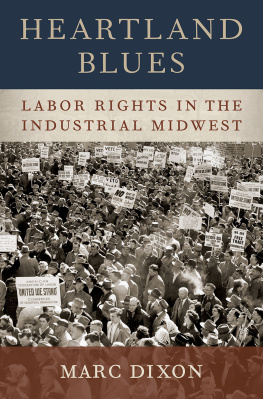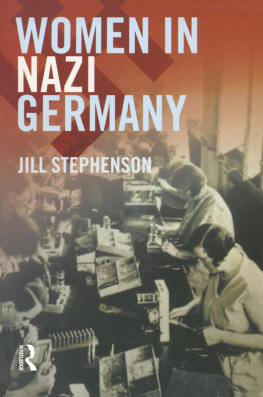Industrial Housewives: Womens Social Work in the Factories of Nazi Germany has also been published as Women & History, Numbers 11/12, 1987.
1987 by The Haworth Press, Inc. All rights reserved. No part of this book may be reproduced or utilized in any form or by any means, electronic or mechanical, including photocopying, microfilm and recording, or by any information storage and retrieval system, without permission in writing from the publisher.
First published by The Haworth Press, Inc.
This edition published 2013 by Routledge
Routledge
Taylor & Francis Group
711 Third Avenue
New York, NY 10017
Routledge
Taylor & Francis Group
2 Park Square, Milton Park
Abingdon, Oxon, OX14 4RN
Routledge is an imprint of the Taylor & Francis Group, an informa business
Library of Congress Cataloging-in-Publication Data
Sachse, Carola, 1951
Industrial housewives.
Has also been published as Women & history, numbers 11/12, 1986T.p. verso. Bibliography: p.
1. Welfare work in industryGermanyHistory. 2. WomenEmploymentGermanyHistory. I. Title.
HD6067.2.G3S23 1986 362.85088042 86-15208
ISBN 0-86656-610-4
EDITOR: ELEANOR S. RIEMER
ASSOCIATE EDITORS: | LOIS FENICHEL |
ALICE MILLER |
CONTRIBUTING EDITOR: JANE CAPLAN
BOARD OF ADVISORS
PHYLLIS ANDORS, Wagner College
LOIS BANNER, George Washington University
RENATE BRIDENTHAL, Brooklyn College, City University of New York*
SANDI COOPER, College of Staten Island, City University of New York*
LEONORE DAVIDOFF, University of Essex, England
ELIZABETH FOX-GENOVESE, State University of New York, Binghamton
BARBARA HARRIS, Pace University*
DOROTHY HELLY, Hunter College, City University of New York*
BARBARA S. KANNER, Occidental College
ALICE KESSLER-HARRIS, Hofstra University
GERDA LERNER, University of Wisconsin
KATHLEEN McCRONE, University of Windsor, Canada
JOANN McNAMARA, Hunter College, City University of New York*
MARY BETH NORTON, Cornell University
SARAH POMEROY, Hunter College, City University of New York*
ANN FIROR SCOTT, Duke University
JOAN SCOTT, Brown University
CARROLL SMITH-ROSENBERG, University of Pennsylvania
ROSALYN TERBORG-PENN, Morgan State University
MARCIA WRIGHT, Columbia University*
*A Fellow of the Institute for Research in History.
Jane Caplan
Womens wage work is an essential component of the nations working life, and the protection and preservation of maternal capacities are the basis for all welfare policies in this area. The German woman should always be conscious of the fact that besides her natural task as the mother of the nation she also serves her people by contributing her labor power in production.
(Gertrud Scholtz-Klink, 1938)1
Thus Gertrud Scholtz-Klink, the leader of the NS-Frauenschaft (the National Socialist Womens Group), described the duties of German womanhood in 1938. For those who have the impression that Nazism aimed simply at forcing women back into the home to produce as many baby aryans as possible, Scholtz-Klinks emphatic insistence on wage work outside the home may seem surprising, and also inconsistent with Hitlers own sharp distinction between the public world of men and the private world of women:
her world is her husband, her family, her children, and her house Providence has entrusted to woman the cares of that world which is peculiarly her own, and only on the basis of this smaller world can the mans world be formed and built up. These two worlds are complementary to each other, they belong together as man and woman belong together.2
The image of womens exclusive consignment to the sphere of reproduction is probably one of the most widespread misapprehensions about Nazi Germany, though it does rest on a partial truth. The gist of much Nazi ideology was indeed to assert an essential sociobiological difference between men and women; a difference that was, of course, said to be harmonized in their equally essential complementarity, as the quotation above suggests. This vision of reconciliation also symbolized the fundamental Nazi commitment to the comprehensive social harmony of the Volksgemeinschaft, the German national and ethnic community, which was seen as a primary unity to be protected from the discordancy of class and other divisions. But the function of such images is often precisely to celebrate in the ideal what cannot in fact be achieved in the real, and thus to act not as a program for policies but as a substitute for them. In practice, then, womens position and their relationship with men in Nazi Germany tended to elude the simplicities of separate-sphere ideology and to emerge as a series of complex and sometimes contradictory realities.
One of the most important aspects of womens situation was their role in the waged economy, for millions of women did work in the waged sector in the 1930s. In 1933, over 41/2 million women could be counted as wage workers in the German economy; in 1939 over five million, and this is without counting the growing numbers of women employed in the white-collar sector.3 It is with some of the implications of womens work in the industrial sector that Carola Sachses essay is concerned. Her specific interest is the organization of industrial social work on behalf of women workers in Nazi Germany, and the competition between the different concepts of factory welfare advanced by the employers and by the womens section of the Nazi Labor Front, the compulsory membership organization for workers and employers. Sachse explores the very different priorities of these authorities as they dealt with issues of workforce welfare, and her essay illuminates above all the contrast between the narrowly productivist interests of the employers on the one hand, and the broader social purposes of Nazi interventionism on the other. As an analysis of policies applied to women workers rather than developed by and for them, this essay stands on its own, to be read as an example of how social policy treats women. However, both the immediate context of Nazi Germany and the longer-term development of German social policy are a part of this story which may be unfamiliar to American readers. In this brief introduction I will set out this framework in the hope that this will add to the interest and approachability of the essay itself.
In the nineteenth century, the two leading European industrial nations, Britain and Germany, were also the pioneers of the modern welfare state. By contrast with the contemporary United States, with its limited sphere of state activity and its cut-throat industrial competition, industrialism in Europe was more characteristically accompanied both by growing state intervention in the social question, and by employer paternalism (in the provision of subsidized housing, for example, or the encouragement of workers mutual benefit societies). Although philanthropic motives and sometimes rather innocent visions of class harmony played a part, both state and employer policies were also frankly self-interested, serving those who feared the social and political consequences of unmitigated industrial capitalism. In Germany, these new impulses combined with the older tradition of the eighteenth-century







